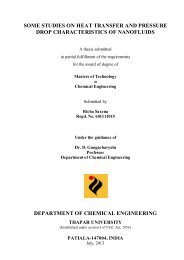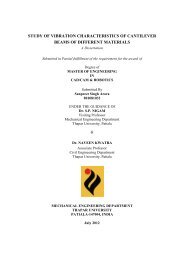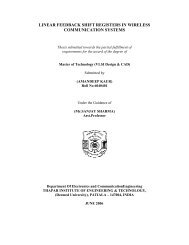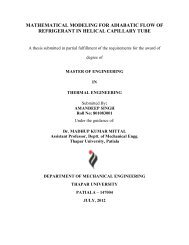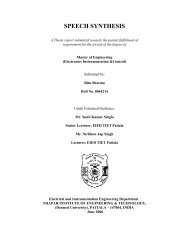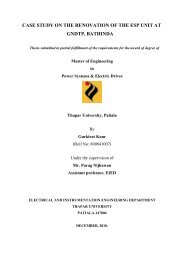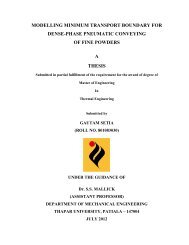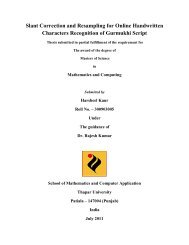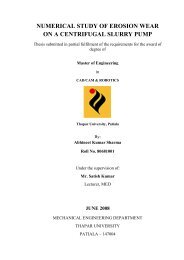from indigenous fermented foods and human gut ... - Thapar University
from indigenous fermented foods and human gut ... - Thapar University
from indigenous fermented foods and human gut ... - Thapar University
Create successful ePaper yourself
Turn your PDF publications into a flip-book with our unique Google optimized e-Paper software.
2<br />
Chapter I: Introduction<br />
Recent research work has credited several health benefits to probiotic organisms<br />
that are <strong>indigenous</strong> to the gastrointestinal tract, as well as those consumed through probiotic<br />
products. Probiotic organisms has been reported to overcome symptoms of lactose<br />
intolerance (deVerse et al., 1992), improved immune function, cholesterol lowering potential<br />
(Noh et al., 1997), antimutagenic activity (Lankaputhra <strong>and</strong> Shah, 1998) <strong>and</strong> treatment of<br />
diarrhea (Gu<strong>and</strong>ilini et al., 2000). Therapeutic activity of probiotic bacteria may be due to<br />
competition with pathogens for nutrients <strong>and</strong> mucosal adherence, production of antimicrobial<br />
substances, <strong>and</strong> modulation of mucosal immune functions (O’sullivan et al., 2005).<br />
Gut microflora<br />
Intestine, its microflora <strong>and</strong> the associated immune system are the ‘natural’ target of<br />
ingested probiotics (De Verse et al., 2002). Therefore, investigations <strong>and</strong> clinical studies of<br />
non-intestinal infections are rather scarce. Human gastrointestinal tract constitutes a complex<br />
microbial ecosystem (Simon <strong>and</strong> Gorbach, 1986). More than 400 different species have been<br />
identified in feces of a single subject (Finegold et al., 1977; Moore et al., 1974). The<br />
equilibrium that exists in the large intestine is dynamic <strong>and</strong> is affected by age, diet<br />
composition <strong>and</strong> other environmental factors. Although these factors are significant, the<br />
continued maintenance of the intestinal microflora, which predominantly contains beneficial<br />
species such as probiotic bacteria, can improve our well being.<br />
The normal intestinal flora <strong>and</strong> some pathogenic bacteria possess the ability to<br />
colonize the mucosal surface of gastrointestinal tract <strong>and</strong> carries out fermentation by<br />
consuming substrates <strong>and</strong> producing end products which significantly influence our health<br />
(Haenel, 1961). There is, however, host specificity in colonization by individual species; for<br />
example, L acidophilus, L. fermentum <strong>and</strong> L. plantarum are commonly found in the feces of<br />
<strong>human</strong>s; whereas L. delb. spp. bulgaricus, which is used in combination with Streptococcus



